Career research in IT: students want to work in large companies

In the Soviet Union there was such a thing as “distribution”: after graduation from the university, the graduate could not choose where to work for him, but went where he was assigned. Moreover, they often had to leave for a completely different region of the country, for three years. Today, each graduate graduate himself is responsible for his job. And if earlier the beginning of the career of a young specialist could be predicted by 90%, now the job search is promising uncertainty and surprises. At least in IT.
As you all know, Mail.Ru Group recently launched the Technopark educational project. Within the framework of this project, talented students study with us. And we are very interested in how they see their future employment, what motivates them and what, on the contrary, they consider an obstacle to their goals. Therefore, this spring, together with the Smart Start company, we surveyed students of IT specialties at a number of leading Moscow universities. And today we want to share with you the results of this survey.
Our questions were answered by students from the following universities:
')
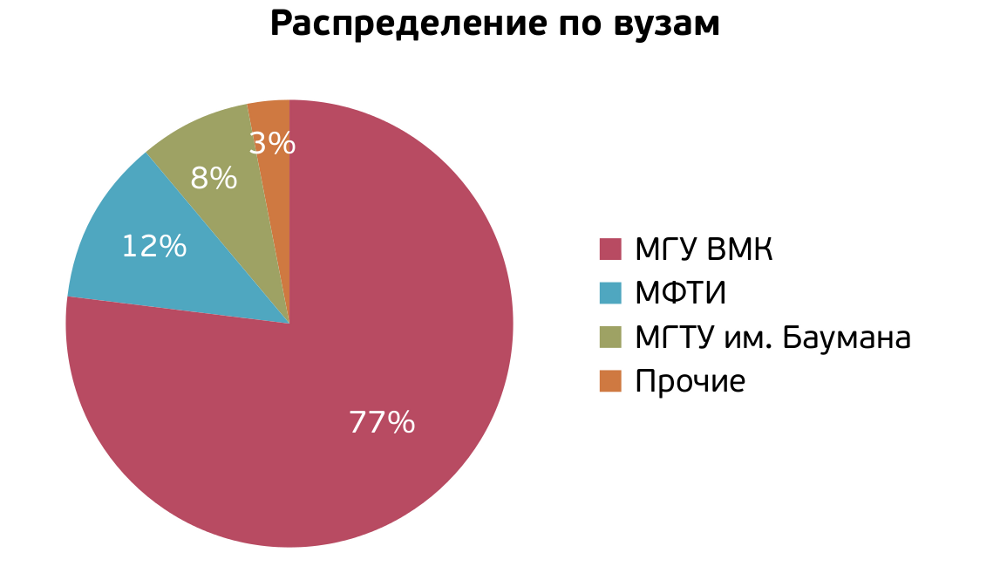
Our respondents distributed the courses as follows:
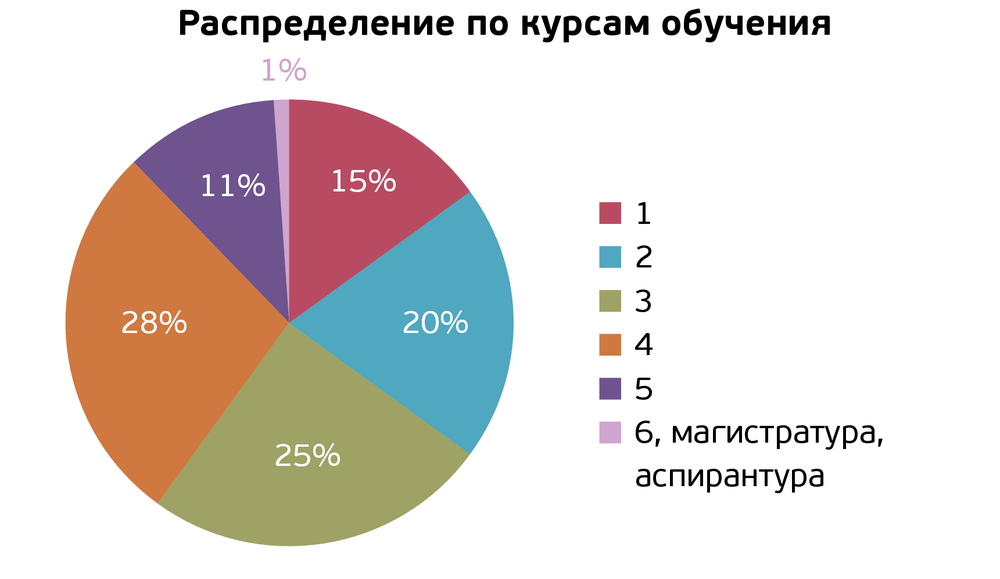
The importance of career growth
First of all, we asked students to evaluate how important career opportunities are for them when choosing a place of work. The average value was 4.21 on a five-point scale. In other words, the importance of this factor can be assessed as high.Career preferences
We further asked which companies, in the students' opinion, had the best opportunities for building a career.
As you can see, more than half believe that it is best to work in large companies. A third prefer smaller companies, but are in the stage of active growth. And about every tenth would prefer to create their own business, rather than climb the job ladder.
In the third question, we were asked to describe which students see their very first job at the beginning of their careers:

The most popular answer is “Developer”. However, of those who plan to do this, far from all decided on a specialization, only 40% of future developers (that is, 16% of all respondents) specified the scope of their activity more precisely - for example, developing in a specific programming language or creating some kind of products.
In second place in popularity was the profession of the designer. It is noteworthy that 3.5% of students are going to build a scientific career. Only 2.7% of respondents plan to start a career with the youngest positions, such as junior developer or assistant system administrator.
In the next paragraph of our questionnaire, we asked what position students see at the very peak of their future careers:
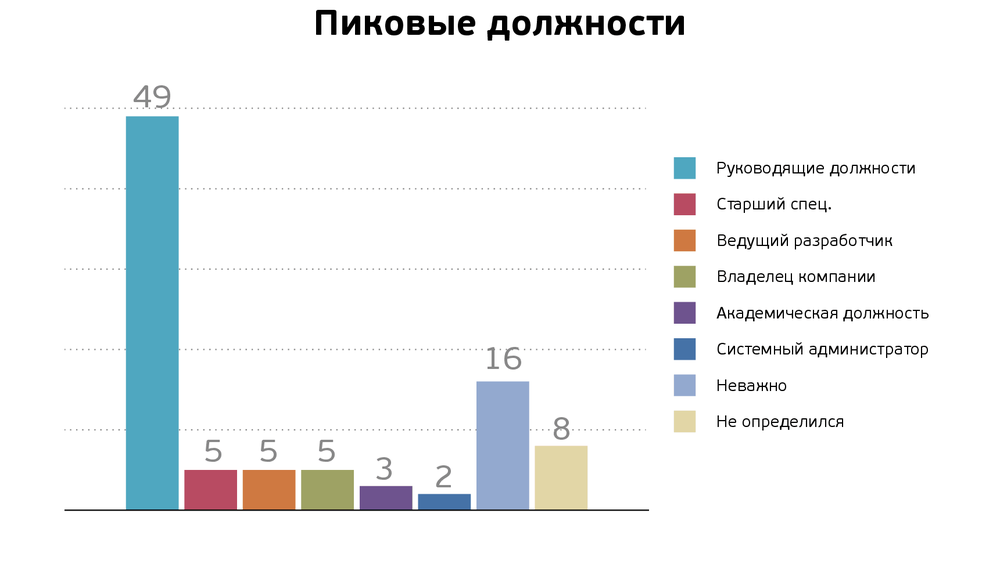
It is quite expected that various managerial positions turned out to be leaders. At the same time, about 37% of those who gave such an answer (or 18% of all respondents) were able to more accurately formulate who and what they would lead. By the way, please note that only 1.5% of the respondents indicated that from the very beginning they would build their careers as managers.

Despite the fact that 40% of students plan to start as developers, at the peak of their careers, only 5% plan to remain in the same field (senior developer, lead developer, senior programmer, software architect). The foggy and uncertain peak of his career is already seen by 8% of students versus 2% of those who have not decided on the very beginning. 16% of students do not attach importance to the position they occupy at the peak, with a third of them further specifying that the main thing is the level of income. 2.7% of respondents answered that they see themselves in science (associate professor, senior researcher, doctor of science), in contrast to 3.5% who wished to start a career in this field.
Next, we asked to assess how long it would take students to reach the peak of their careers since it began. The average time was equal to 8 years, the minimum - 1 year, the maximum - 30 years. At the same time, there was no connection between the selected peak position and the time necessary to achieve it.
Positive and negative factors for career growth
Here we offered students two sets of factors: the first accelerates career growth, the second slows it down. It was necessary to choose from each set no more than three "accelerators", and the number of "moderators" was not limited.
* Infrastructure at the university, here: job fairs, business incubators, relations with companies - the value was disclosed in the relevant paragraph of the questionnaire.
Here the most popular answers were diligence, creativity and vigor. The third place was shared by the shortage of the chosen specialty and the knowledge and skills obtained during the training.
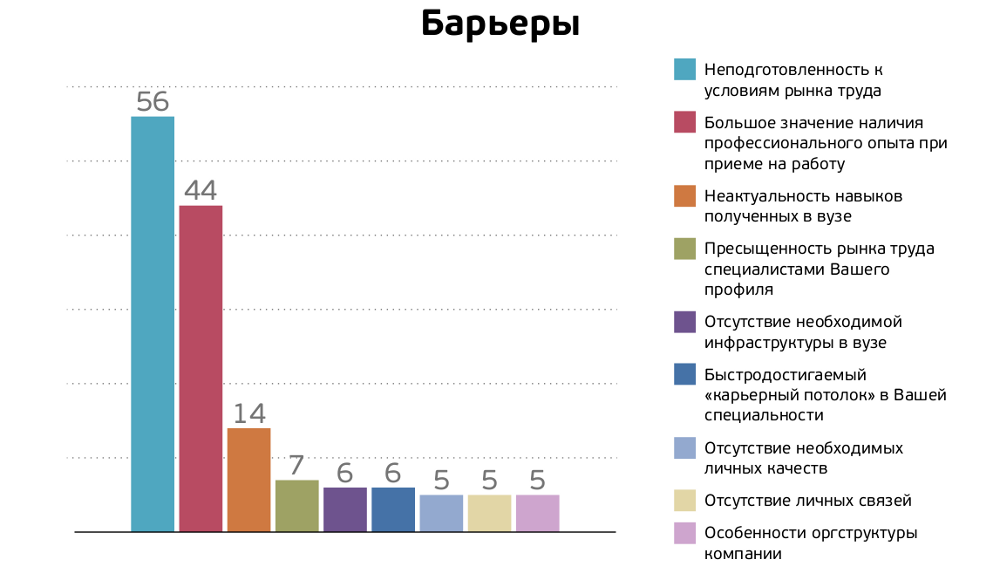
Over half of the students believe that the construction of their career will prevent unpreparedness for the conditions of the labor market. Please note that this has nothing to do with their level of knowledge and skills. The second place (with a large margin from the third) is occupied by the importance of having professional experience for a potential employer.
Career and education
At the end of the questionnaire, we asked students to evaluate the impact of the education they received on future career growth on a 7-point scale (1 - the most negative, 4 - absent, 7 - the most positive). It is no secret that many students view their studies only as a forced way of obtaining a diploma, which does not help a future career. We were interested in the situation among students of IT-specialties in the leading universities of the country. It turned out that this opinion is typical for our respondents.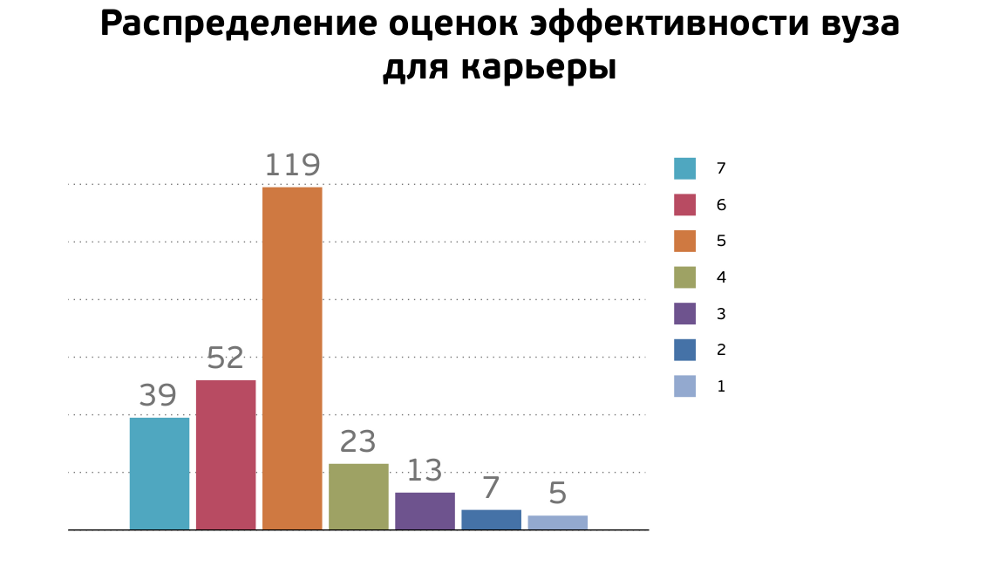
Despite the fact that 18% indicated the importance for career of knowledge and skills acquired at the university, in the question about barriers 14% pointed to the “irrelevance of the skills acquired during education”. In other words, it can help both in building a career and interfere.
Let us consider in more detail the most important “barrier” for most students - “unpreparedness for the conditions of the labor market.” This may be expressed in various factors, but one of the most significant is the focus of the Russian higher education system on the transfer of knowledge, rather than on the issue of professionals who are prepared for competition in the labor market.
The interviewed students did not pay much attention to such factors as the “university infrastructure” (job fairs, relations with companies, business incubators, etc.) “contacts acquired at the university”. This may indicate both low awareness of students about the partnership opportunities of the university and companies, as well as insufficient efforts to involve these opportunities in the educational process and in the recruitment process.
The data obtained by us allows everyone to make both positive and negative conclusions. We made ours for ourselves, but what did you come to?
Source: https://habr.com/ru/post/226015/
All Articles